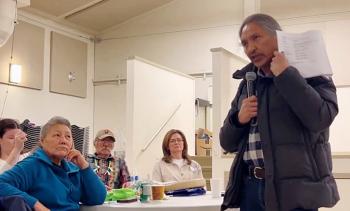Image Caption
Summary
Local Journalism Initiative Reporter
Windspeaker.com
Chief Allan Adam and the Athabasca Chipewyan First Nation (ACFN) are taking legal action against both the Alberta government and the Alberta Energy Regulator (AER).
In a statement of claim filed in the Court of King’s Bench Alberta in Edmonton Wednesday March 6 and presented to AER CEO Laurie Pushor in Fort Chipewyan last night at a community meeting, ACFN is asking the court to direct the government to pay the northern First Nation “all or part of the royalties or equivalent payments” the province received from Kearl Oil from May 2022 to November 2023.
That period encompasses three “large-scale and uncontrolled discharges” of industrial wastewater that impacted ACFN’s traditional lands and traditional way of life.
Royalties are pegged at a rate of more than $50 million per month.
“I’m handing you these court documents that says that the AER is going to be going to court and…pursued for the negligence that you've caused to the community of Fort Chip,” said Adam in presenting the documents to Pushor.
Adam was applauded by those gathered at the Mamwai Community Hall.
The statement of claim outlines how AER was made aware of the discharges from the tailings ponds downstream of Fort Chipewyan but did not inform ACFN about “their potential impact on the lands and waters where ACFN members exercise their Treaty rights.”
From May 2022 to February 2023 there were ongoing uncontrolled discharges of tailings from Kearl. While the total of the first discharge is unknown, the second discharge was at least 5.3 million litres. On Nov. 13, 2023, a third discharge occurred with approximately 670,000 litres of contaminated water flowing into the Muskeg River.
Along with asking for royalties, ACFN is asking for general, special, punitive and aggravated damages in the amount of $500 million.
The statement of claim outlines how the discharges caused “psychological, social and cultural harm” to ACFN members. Members were unable to exercise their Aboriginal rights to hunt, fish and gather because of “fear and anxiety” over environmental safety. They also stopped drinking water from the land and had to rely on bottled water.
ACFN is also looking for a declaration that the regulatory and policy framework controlling tailing facilities is inconsistent with section 35 of the Constitution Act.
“This regulatory regime infringes the rights of ACFN in its structure and operation, and is unconstitutional and must be declared so,” says the statement of claim.
The AER, established by the Alberta government, regulates the development of energy projects in the province. The statement of claim says the AER “owed a duty of care” to ACFN and by not warning the First Nation of the discharges, AER breached its duty of care.
Going further, the statement says that both the province and AER knew they should have engaged with ACFN following the first discharge and, in not doing so, they breached the Duty to Consult.
“We are the first ones to be impacted for what happens upstream from our community. And we need answers,” Adam told Pushor. “You will answer in the court of law.”
Pushor accepted the court document from Adam and the two men shook hands.
“I want you to know that I will always respect democratic institutions in this country and the courts, so we will do what is right and appropriate in response to this and work our way through it,” said Pushor.
The province and AER have 20 days to file a statement of defence.
Local Journalism Initiative Reporters are supported by a financial contribution made by the Government of Canada.

